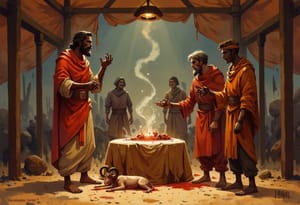| Series | Sheep and Shepherds |
|---|---|
| Theme | Sheep and Shepherds - Mamoe ma leoleo mamoe |
| Colour | Lanu Meamata |
| Special Day | Asiasiga – Komiti o Fe’au Eseese |
Scripture Focus: Levitiko 8:18–29
He presented the ram of the burnt offering. Aaron and his sons laid their hands on the head of the ram. He killed it; and Moses sprinkled the blood around on the altar.
- Leviticus 8:18–29 (WEB)
Study:
Leviticus 8 details the consecration of Aaron and his sons as priests. Verses 18-29 specifically describe the presentation of the sacrifice – a bull and two rams – to atone for the sins of the priests themselves before they could begin their service. The meticulous process, involving sprinkling blood on the altar, on Aaron and his sons, and washing rituals, highlights the utter holiness of God and the necessity of purification before approaching Him. This isn’t simply about physical cleanliness; it’s a symbol of spiritual cleansing and the removal of sin. Each action was deliberate, ordained by God, and pointed to a future, perfect sacrifice. The laying on of hands, signifying identification with the offering, foreshadows the laying on of hands in the New Testament, connecting to Jesus’s ultimate atoning sacrifice. The focus on the blood emphasizes its life-giving, purifying power, representing the price of redemption.
Application:
We often think of priests offering sacrifices *to* God, but this passage reminds us that even those appointed to sacred service need cleansing. It’s a humbling reminder that we all fall short of God's glory. Jesus is our ultimate High Priest, and His sacrifice on the cross was the perfect and final offering for sin - not only for the priests of old, but for *all* believers. Unlike the continual sacrifices required in the Old Testament, Jesus’ sacrifice is complete and sufficient. We can approach God not through animal offerings, but through faith in Jesus and the shedding of His blood. We are now part of a ‘royal priesthood’ (1 Peter 2:9), called to offer spiritual sacrifices of praise and thanksgiving.
Reflection Questions:
- How does this passage illustrate the holiness of God?
- What does the emphasis on blood signify in this context?
- In what ways does Jesus fulfill the role of the High Priest described in Leviticus?
- How can we, as members of the “royal priesthood”, offer spiritual sacrifices to God today?
- What does it mean to you that Jesus’ sacrifice is a “complete and sufficient” offering?
Prayer:
Heavenly Father, thank You for the perfect sacrifice of Your Son, Jesus Christ. Thank You that through His blood, we are cleansed and made righteous in Your eyes. Help us to live lives worthy of Your calling, offering spiritual sacrifices pleasing to You. Remind us daily of the incredible gift of grace we have received. In Jesus' name, Amen.
Tags: Leviticus, sacrifice, priesthood, atonement, consecration, Aaron, High Priest, Jesus, redemption, holiness, blood, spiritual sacrifice, Old Testament, New Testament, sheep and shepherds, purification
